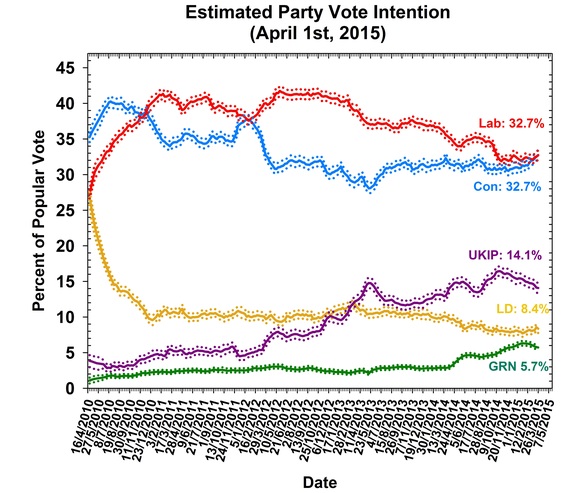One of the defining themes of the 2010-15 Parliament has been popular anger with the Westminster political establishment, the so-called "LibLabCon", which has helped fuel surging support for UKIP, the Greens and the SNP, and pushed the combined polling share of the tree establishment parties to all time lows. Yet as we enter the final furlongs of an exhausting election marathon, something remarkable seems to be happening: the insurgent parties are running out of steam, and the traditional parties of government are winning back support.
The Conservatives' rise is the more impressive - an increase of 1.2 percentage points in March, which puts the party on 32.7, the first time the Tories have broken out of the 30-32 percent band since the spring of 2012. Labour, however, also recovered ground last month, picking up 0.5 points to achieve exactly the same estimated share. Both main insurgent parties fell back in March. UKIP lost 0.7 points, falling to 14.1 per cent. This leaves their poll share back where it was last summer, before the defections of Douglas Carswell and Mark Reckless, but still over 10 per cent about the share they received in the last election. However, they still face a hard battle to convert votes into seats, as underlined by a leaked internal poll that put party leader Nigel Farage slightly behind in a tough fight for Thanet South. The Greens also fell back by 0.7 points. While some may point to the indifferent media performances of Green leader Natalie Bennett as a factor in this, the simultaneous fall in UKIP support suggests something more fundamental may be at work.
The Liberal Democrats have not shared in the mainstream parties' recovery, or the insurgent parties' decline - instead we have stable on 8.4% of the vote, the same as last month. They will be relieved to have arrested the slide in their national poll numbers, but their fate depends more on local fights. They will therefore be more concerned by Lord Ashcroft's latest polling of competitive Lib Dem marginals. While Ashcroft finds the party gaining ground in four of the eight seats, they have only moved into a solid lead in one (Cambridge). The Conservatives have opened up a strong lead in two other seats, while for the second time Lord Ashcroft found Nick Clegg trailing Labour in his own, formerly ultra-safe seat of Sheffield Hallam (despite evidence of large scale Conservative tactical voting for Clegg). The Lib Dems' Parliamentary fate hangs on uneven and unpredictable local battles.
The return of voters to the traditional governing parties, while surprising to many pundits, is something our election forecasting model has long been predicting should happen, as history suggests that when parties are well below their long running "equilibrium" share they tend to pick up some support as the election approaches. Several factors specific to 2015 may also be contributing - for example, the extreme closeness of the election, which will make backing a new party more costly than usual for voters with a preference between the "big two"; public uncertainty about the ability of the insurgent parties (the SNP excepted) to govern; the insurgent parties' relatively weak organisation and campaign infrastructure, higher than usual motivation from the established parties' activists and donors, and the growing media focus on the very tight race between the two largest parties. Whatever the reasons, it seems that there is still some fight left in the "old politics" parties even after many months on the ropes, while the new players facer an even tougher challenge than they realised.
Both parties also enter the final stretch with one historical advantage, and one disadvantage. History suggests the Conservatives will continue to gain ground in the final stages, suggesting a Tory lead in votes on election day is the likelier outcome. However, the lead should be slender, and could be offset by Labour's advantage in converting votes to seats - though there are now some doubts as to whether this will still apply in 2015. However, both these prospects are highly uncertain, and it is quite possible neither will happen on May 7th. With only weeks to go in this closest and least predictable of election campaigns, everything is still up for grabs.
Robert Ford, Will Jennings, Mark Pickup and Christopher Wlezien
This is the forty-sixth in a series of posts that report on the state of the parties as measured by opinion polls. By pooling together all the available polling evidence we can reduce the impact of the random variation each individual survey inevitably produces. Most of the short term advances and setbacks in party polling fortunes are nothing more than random noise; the underlying trends - in which we are interested and which best assess the parties' standings - are relatively stable and little influenced by day-to-day events. If there can ever be a definitive assessment of the parties' standings, this is it. Further details of the method we use to build our estimates of public opinion can be found here.
